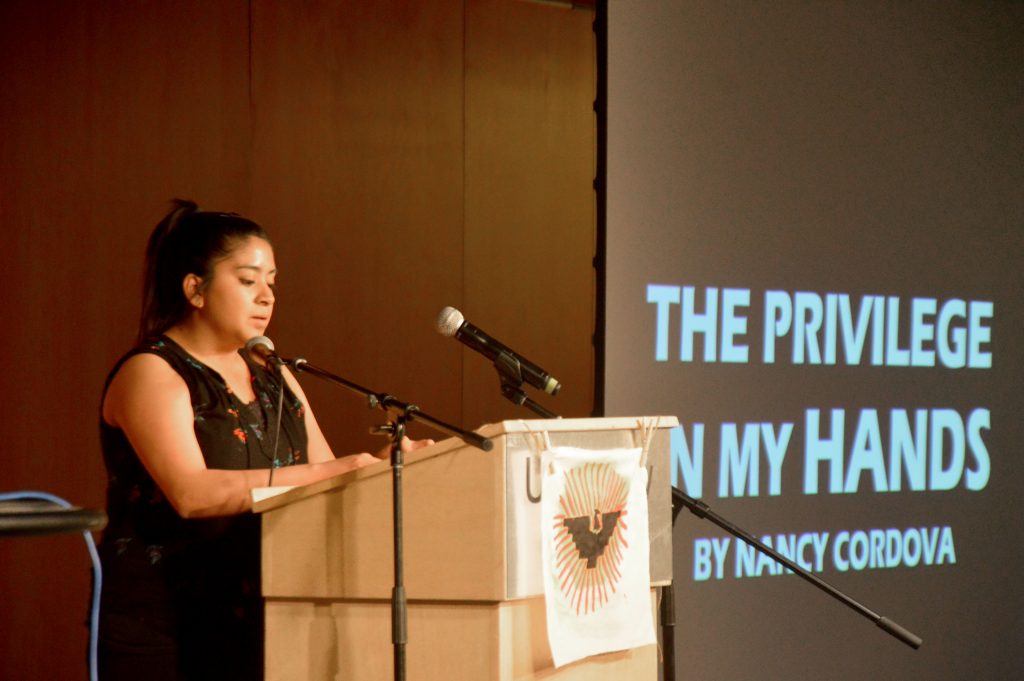National Farmworkers Awareness week started on Monday and brought with it a week of programing from the College Assistance Migrant Program (CAMP).
“CAMP is a federal program created to serve first year students who come from a migrant or fieldworker background. We provide assistance such as academic, financial and other services,” said Victor Canales, CAMP recruitment specialist and co-host of the Thursday event Voces del Campo.
At the event, students gathered in the Bruce Pitman Center Vandal Ballroom to tell stories about what it is like to work in the fields and the people who work in them.

Nancy Cordova reads her piece, “The Privilege in my Hands” during Voces del Campo Thursday.
Kali Nelson | Argonaut
“Knowing that CAMP scholars come from this background its crucial to highlight our stories, our student’s stories and our familia stories,” Canales said.
The Vandal Ballroom was decorated with bandanas with phrases such as “justice for farmworkers” and “Farmworkers feed the world.”
The event also included a drive in which long sleeve shirts, hats and gloves were collected. All donations will go to Southern Idaho farmworkers to a display on the free speech wall, according to the Facebook event for the week.
“Voces del Campo started as a panel of UI CAMP scholars who were invited to share their farm working stories with our university and our community. The idea came from a former CAMP scholar who thought it was important to highlight the stories of our own students and families,” said Christina Vazquez-Ayala, CAMP recruitment specialist and cohost of the event.
Much of the audience was made up of UI students and a small group of Idaho State University students.
The students read anonymous submissions, poetry and short essays. Topics ranged from interpersonal violence to the community.
Valeria Ramirez, a third-year student at the University of Idaho presented her poem, “Our Skin.”
“Our skin is what hard work looks like, hours in the sun, where our backs are down in the fields alike. Why can’t you see the hurt that you bring? Thousands march towards the same thing, our families came from sacrifice, their way for a better life,” Ramirez said.
Ramirez said America was not built to build boarders or take children from their parents.
“It wasn’t built to cause hate towards diversity, but it does,” Ramirez said.
Both Canales and Vazquez-Ayala then stressed the importance of voting and remaining politically active.
“This is a good reminder to vote and do your research on who you will be voting for because politics do affect our community,” Canales said.
The last piece shared was from a recent UI graduate who spoke about the privilege she had from her mother’s work in the field.
“They are small and fragile and have no scars or dryness to them. When I look at them, they too have worked endless hours but not like my mother’s. My mother’s hands are small and mighty but scared from the long hours she worked them,” Nancy Cordova said.
Cordova spoke about how her hands were much different than her mother’s because her mother had worked in the fields to provide for her children.
“So, what are we going to do with the privilege in our hands? Well I have a suggestion for y’all. Lets continue to use our privileges to empower our community and be a voice for our familias,” Vazquez-Ayala said.
Kali Nelson can be reached at [email protected] or on Twitter @kalinelson6
